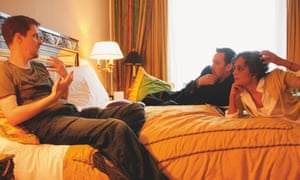************
The Indian novelist recalls an extraordinary encounter in a Moscow hotel
with the NSA whistleblower
What mattered, perhaps even more than what was said, was the spirit in the room. There was Edward Snowden who, after 9/11, was in his own words “straight up singing highly of Bush” and signing up for the Iraq war.
And there were those of us who, after 9/11, had been straight up doing
exactly the opposite. It was a little late for this conversation, of
course. Iraq has been all but destroyed. And now the map of what is so
condescendingly called the “Middle East” is being brutally redrawn (yet
again). But still, there we were, all of us, talking to each other in a
bizarre hotel in Russia. Bizarre it certainly was.
The opulent lobby of the Moscow Ritz-Carlton was teeming with drunk millionaires, high on new money, and gorgeous, high-stepping young women, half peasant, half supermodel, draped on the arms of toady men – gazelles on their way to fame and fortune, paying their dues to the satyrs who would get them there. In the corridors, you passed serious fistfights, loud singing and quiet, liveried waiters wheeling trolleys with towers of food and silverware in and out of rooms. In Room 1001 we were so close to the Kremlin that if you put your hand out of the window, you could almost touch it. It was snowing outside. We were deep into the Russian winter – never credited enough for its part in the second world war. Edward Snowden was much smaller than I thought he’d be. Small, lithe, neat, like a house cat. He greeted Dan ecstatically and us warmly. “I know why you’re here,” he said to me, smiling. “Why?” “To radicalise me.” I laughed.
We settled down on various perches, stools, chairs and John’s bed. Dan and Ed were so pleased to meet each other, and had so much to say to each other, that it felt a little impolite to intrude on them. At times they broke into some kind of arcane code language: “I jumped from nobody on the street, straight to TSSCI.” “No, because, again, this isn’t DS at all, this is NSA. At CIA, it’s called COMO.” “It’s kind of a similar role, but is it under support?” “PRISEC or PRIVAC?” “They start out with the TALENT KEYHOLE thing. Everyone then gets read into TS, SI, TK, and GAMMA-G clearance... Nobody knows what it is…”
It took a while before I felt it was all right to interrupt them. Snowden’s disarming answer to my question about being photographed cradling the American flag was to roll his eyes and say: “Oh, man. I don’t know. Somebody handed me a flag, they took a picture.” And when I asked him why he signed up for the Iraq war, when millions of people all over the world were marching against it, he replied, equally disarmingly: “I fell for the propaganda.”
Dan talked at some length about how it would be unusual for US citizens who joined the Pentagon and the National Security Agency to have read much literature on US exceptionalism and its history of warfare. (And once they joined, it was unlikely to be a subject that interested them.) He and Ed had watched it play out live, in real time, and were horrified enough to stake their lives and their freedom when they decided to be whistleblowers. What the two of them clearly had in common was a strong, almost corporeal sense of moral righteousness – of right and wrong.
A sense of righteousness that was obviously at work not just when they decided to blow the whistle on what they thought to be morally unacceptable, but also when they signed up for their jobs – Dan to save his country from communism, Ed to save it from Islamist terrorism. What they did when they grew disillusioned was so electrifying, so dramatic, that they have come to be identified by that single act of moral courage.
Please continue this article here: http://www.theguardian.com/lifeandstyle/2015/nov/28/conversation-edward-snowden-arundhati-roy-john-cusack-interview
 |
| Roy with (from left) Daniel Ellsberg, Edward Snowden and John Cusack. Photograph: Courtesy of John Cusack |

No comments:
Post a Comment